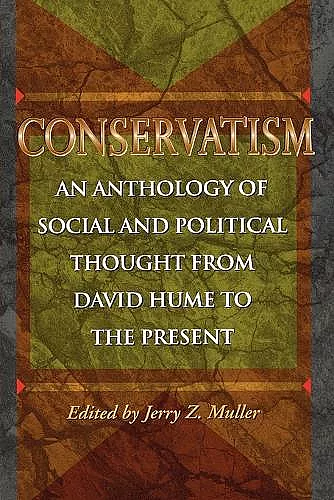Conservatism
An Anthology of Social and Political Thought from David Hume to the Present
Format:Paperback
Publisher:Princeton University Press
Published:11th Jun '97
Currently unavailable, and unfortunately no date known when it will be back

A richly diverse, intelligently designed, and helpfully annotated introduction to the world of conservative theory. No comparable collection that I know of is as broad and unparochial as this one. -- Thomas Pangle, University of Toronto
Offers a historically informed presentation of what is distinctive about conservative social and political thought. This volume locates the origins of "modern"���' conservatism within the Enlightenment and distinguishes between conservatism and orthodoxy. It contains an afterword on recurrent tensions and dilemmas of conservative thought.At a time when the label "conservative" is indiscriminately applied to fundamentalists, populists, libertarians, fascists, and the advocates of one or another orthodoxy, this volume offers a nuanced and historically informed presentation of what is distinctive about conservative social and political thought. It is an anthology with an argument, locating the origins of modern conservatism within the Enlightenment and distinguishing between conservatism and orthodoxy. Bringing together important specimens of European and American conservative social and political analysis from the mid-eighteenth century through our own day, Conservatism demonstrates that while the particular institutions that conservatives have sought to conserve have varied, there are characteristic features of conservative argument that recur over time and across national borders. The book proceeds chronologically through the following sections: Enlightenment Conservatism (David Hume, Edmund Burke, and Justus Moser), The Critique of Revolution (Burke, Louis de Bonald, Joseph de Maistre, James Madison, and Rufus Choate), Authority (Matthew Arnold, James Fitzjames Stephen), Inequality (W. H. Mallock, Joseph A. Schumpeter), The Critique of Good Intentions (William Graham Sumner), War (T. E. Hulme), Democracy (Carl Schmitt, Schumpeter), The Limits of Rationalism (Winston Churchill, Michael Oakeshott, Friedrich Hayek, Edward Banfield), The Critique of Social and Cultural Emancipation (Irving Kristol, Peter Berger and Richard John Neuhaus, Hermann Lubbe), and Between Social Science and Cultural Criticism (Arnold Gehlen, Philip Rieff). The book contains an afterword on recurrent tensions and dilemmas of conservative thought.
"Muller's book is a bracing commentary on the present-day condition of American conservatism, and a welcome invitation to rethink what conservatives ought to be conserving."--Charles R. Kesler, Wilson Quarterly "A smartly designed anthology. Muller is a capable teacher... He brings a freshness to old standbys like Edmund Burke and James Madison and unearths fascinating conservative passages from Winston Churchill and several lesser lights. The readings may be the meat of the book, but Muller's take on conservatism is its lifeblood. His afterword... is nothing short of brilliant... Muller's exciting anthology effectively shows that conservatism, for all its apparent stodginess, is remarkably alive and organic."--John J. Miller, The Detroit News "Jerry Muller's thoughtful primer on conservative thinkers from David Hume to the present day is timely. If the dispossessed of the right feel the need to go back to basics, they could do worse than start here... This anthology, with Muller's useful introductions to the work of two dozen or so political theorists, reminds us that conservatism has always been the most amorphous of political philosophies."--Philip Stephens, Financial Times "Mr. Miller has covered the bases well, giving a good accounting of the breadth and variety of the subject he anthologizes."--Stephen Goode, Washington Times
ISBN: 9780691037110
Dimensions: unknown
Weight: 680g
472 pages